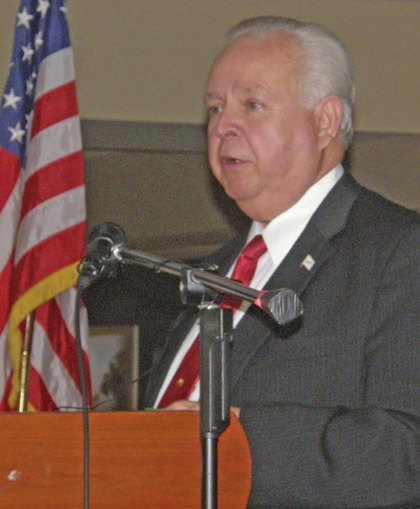Against a backdrop of good news all too rare in this tough economic climate, Auburn Mayor Pete Lewis gave his final State of the City address Tuesday afternoon at Emerald Downs before an audience of local business and civic leaders.
He started out ticking off notable successes in the business sector.
In 2012, Lewis said, a number of new businesses, with more than 1,200 jobs in tow, opened or set down roots in Auburn. Among the notable new businesses, expansions, and here-but-yet-to-opens: Coastal Farm and Ranch, which opened in the old Walmart store next to the SuperMall after spending $20 million to fix up the building; The owners of the Outlet Collection Seattle, a.k.a. The SuperMall — announced they would invest $35 million in renovations and thereby add 1,000 new jobs overall to Auburn; the regional Hospital Cooperative Services Administration broke ground in August on a $26 million new laundry facility that by next summer will bring 185 living wage jobs to Auburn; and Boeing launched 74 projects in 2012 with a cumulative construction valuation of about $31 million.
Among other businesses that opened in 2012: Eagle Leather, Turning Point Studios, North America Pipe and Steels and AIM Aerospace
Next week the Auburn School District breaks ground on the $110 million dollar Auburn High construction and renovation project, financed by a bond approved by district voters last November.
Giving all that growth a push, Lewis said, was the new Mayor’s Task Force, a panel made up of more than 20 local business leaders who come together to create and guide the activities of Auburn’s Urban Center for Innovative Partnership, or IPZ. As the state’s 15th IPZ, Auburn’s is the only city-based one that the State of Washington has certified so far.
The Sister Cities program registered a success in 2012 when it established relations with the Korean Chamber of Commerce and other business partners, leading the Seattle Food Company to buy up 165,000 square feet of space with the goal of relocating to Auburn.
The City also developed and published a comprehensive list of local-state-federal business incentives for on-going business attraction and for specific marketing of Auburn as “the place to conduct business,” Lewis said.
Turning to the human services sector, Lewis said the city lent help in 2012 to redevelop a blighted downtown apartment complex – The Pines — shaping it into new market-affordable units. While Auburn has more affordable housing than most cities in the region, Lewis said, it is time to upgrade its existing housing stock.
After taking stock of the number of abandoned homes and weed wild properties proliferating in the city, Lewis continued, the Auburn City Council approved ordinances to speed up the code enforcement process and to allow the City to place liens on properties and stop transfers until the owners clean up their scruffy properties. Today on the City’s website, Auburn’s Wall of Shame allows residents to post a picture of each unshaven property, its address, the mortgage holder and his or her contact information so people and potential buyers may call them and remind them about their obligations.
As far as transportation, the City in 2012 opened the new A-B Street corridor to provide a new north-south route from the Transit Center to Auburn’s northern limits at South 277th Street. Last year the city brought home 26 grants worth $16.4 million, Lewis said.
In 2012 the City used some of its grant money from the State of Washington to buy a small lake on the West Hill, which will soon be the center of a new park. Working with the state of Washington and King County, the City elsewhere put together two parcels to give itself a beach area north of Porter’s bridge.
In 2012, the City, Lewis continued, completed the first phase of its Auburn Environmental Park Wetland Trail Boardwalk project and planted more than 1,000 native shrubs and trees there. It obtained as well two new environmental restoration grants totaling $627,350 and administered eight existing environmental grants totaling $1.4 million.
One another notable accomplishment: the Jan. 1 opening of Auburn Valley Humane Society’s new animal shelter on A Street Southeast, in partnership with the city of Auburn.
Among the things city needs does not yet have but will continue to press for in 2013, Lewis said, is the second garage at the Sound Transit Station, a bypass connecting State Route 164 to Highway 18 and a new Lea Hill bridge.



